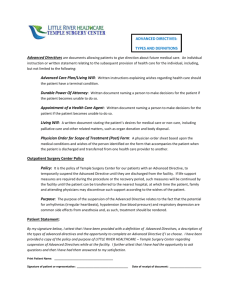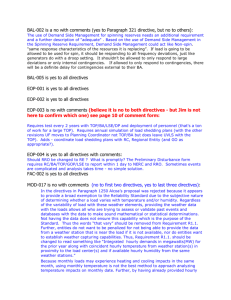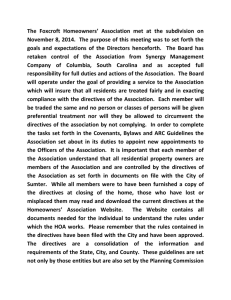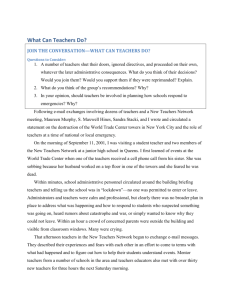Broader Public Sector Accountability Act, 2010, S.O.
advertisement
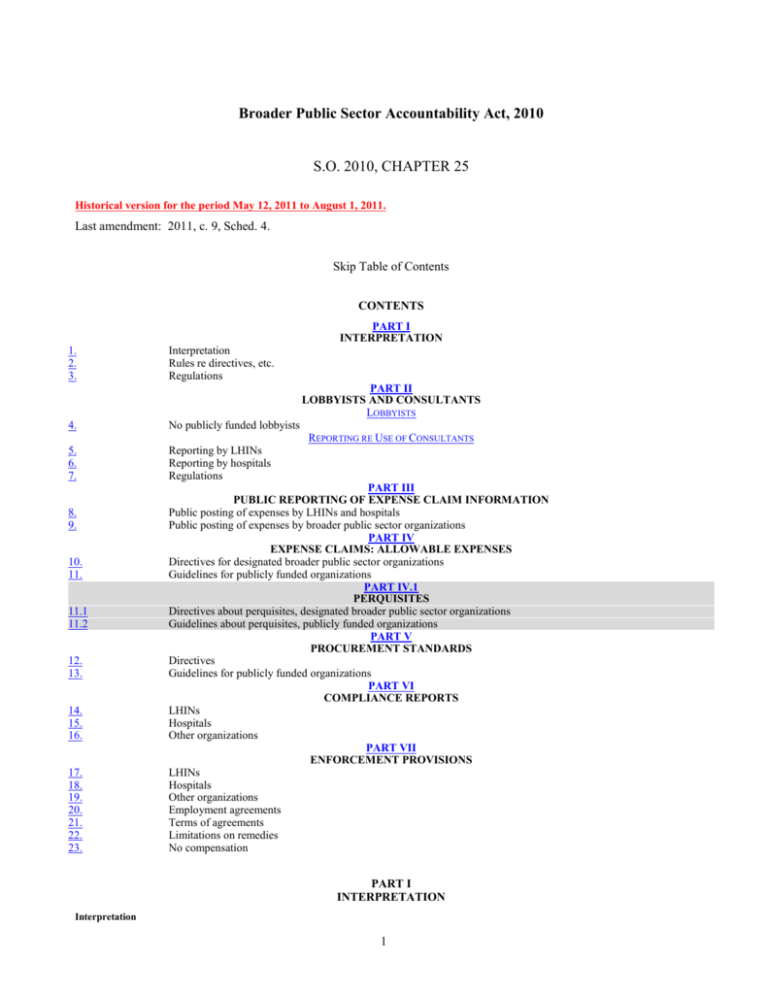
Broader Public Sector Accountability Act, 2010 S.O. 2010, CHAPTER 25 Historical version for the period May 12, 2011 to August 1, 2011. Last amendment: 2011, c. 9, Sched. 4. Skip Table of Contents CONTENTS PART I INTERPRETATION 1. 2. 3. Interpretation Rules re directives, etc. Regulations PART II LOBBYISTS AND CONSULTANTS LOBBYISTS 4. No publicly funded lobbyists 5. 6. 7. Reporting by LHINs Reporting by hospitals Regulations REPORTING RE USE OF CONSULTANTS 8. 9. 10. 11. 11.1 11.2 12. 13. 14. 15. 16. 17. 18. 19. 20. 21. 22. 23. PART III PUBLIC REPORTING OF EXPENSE CLAIM INFORMATION Public posting of expenses by LHINs and hospitals Public posting of expenses by broader public sector organizations PART IV EXPENSE CLAIMS: ALLOWABLE EXPENSES Directives for designated broader public sector organizations Guidelines for publicly funded organizations PART IV.1 PERQUISITES Directives about perquisites, designated broader public sector organizations Guidelines about perquisites, publicly funded organizations PART V PROCUREMENT STANDARDS Directives Guidelines for publicly funded organizations PART VI COMPLIANCE REPORTS LHINs Hospitals Other organizations PART VII ENFORCEMENT PROVISIONS LHINs Hospitals Other organizations Employment agreements Terms of agreements Limitations on remedies No compensation PART I INTERPRETATION Interpretation 1 1. (1) In this Act, “agency of the Government of Ontario” means a public body designated in regulations made under the Public Service of Ontario Act, 2006; (“organisme du gouvernement de l’Ontario”) “broader public sector organization” means, (a) a designated broader public sector organization, and (b) a publicly funded organization; (“organisme du secteur parapublic”) “community care access corporation” means a community care access corporation within the meaning of the Community Care Access Corporations Act, 2001; (“société d’accès aux soins communautaires”) “consultant” means a person or entity that under an agreement, other than an employment agreement, provides expert or strategic advice and related services for consideration and decision-making; (“expert-conseil”) “designated broader public sector organization” means, (a) every hospital, (b) every school board, (c) every university in Ontario and every college of applied arts and technology and post-secondary institution in Ontario whether or not affiliated with a university, the enrolments of which are counted for purposes of calculating annual operating grants and entitlements, (d) every approved agency designated as a children’s aid society under subsection 15 (2) of Part I of the Child and Family Services Act, (e) every community care access corporation, (f) every corporation controlled by one or more designated broader public sector organizations that exists solely or primarily for the purpose of purchasing goods or services for the designated broader public sector organization or organizations, (g) every publicly funded organization that received public funds of 10 million dollars or more in the previous fiscal year of the Government of Ontario, and (h) every organization that is prescribed for the purposes of this definition; (“organisme désigné du secteur parapublic”) “hospital” means, (a) a public hospital, (b) a private hospital that received public funds in the previous fiscal year of the Government of Ontario, and (c) the University of Ottawa Heart Institute/Institut de cardiologie de l’Université d’Ottawa; (“hôpital”) “lobbyist” means an individual who acts as a consultant lobbyist within the meaning of section 4 of the Lobbyists Registration Act, 1998, and does not include an in-house lobbyist within the meaning of section 5 or 6 of that Act; (“lobbyiste”) “lobbyist services” means services undertaken by a lobbyist that constitute lobbying within the meaning of the Lobbyists Registration Act, 1998; (“services de lobbyiste”) “local health integration network” means a local health integration network within the meaning of the Local Health System Integration Act, 2006; (“réseau local d’intégration des services de santé”) “long-term care home” means a long-term care home within the meaning of the Long-Term Care Homes Act, 2007; (“foyer de soins de longue durée”) “private hospital” means a private hospital within the meaning of the Private Hospitals Act; (“hôpital privé”) “public funds” means the public money of the province of Ontario that is provided by the Government of Ontario or an agency of the Government of Ontario, directly to any authority, board, commission, committee, corporation, council, foundation or organization through a grant or transfer payment or other funding arrangement, and, in the case of a school board, includes money received by the school board from taxes levied under the Education Act for school purposes, but public funds does not include, (a) money that is paid for the provision of goods or services to the Government of Ontario or an agency of the Government of Ontario, (b) money that is paid by the Government of Ontario or an agency of the Government of Ontario under a fee for service arrangement, or 2 (c) money that is provided by the Government of Ontario or an agency of the Government of Ontario, by way of a loan or loan guarantee; (“fonds publics”) “publicly funded organization” means every authority, board, commission, committee, corporation, council, foundation or organization that received public funds in the previous fiscal year of the Government of Ontario, but does not include, (a) the Office of the Lieutenant Governor, (b) the Office of the Assembly or the office of an officer of the Assembly, (c) a ministry of the Government of Ontario, (d) an agency of the Government of Ontario, (e) a municipality, (f) subject to the regulations, a local board as defined in section 1 of the Municipal Act, 2001 and section 3 of the City of Toronto Act, 2006, (g) a board of health under the Health Protection and Promotion Act, (h) subject to the regulations, an organization that undertakes its activities for the purpose of profit to its shareholders, (i) a long-term care home, or (j) any organization excluded under the regulations; (“organisme financé par des fonds publics”) “public hospital” means a hospital within the meaning of the Public Hospitals Act; (“hôpital public”) “school board” means a board as defined in the Education Act. (“conseil scolaire”) 2010, c. 25, s. 1 (1). Interpretation re Crown agent (2) Nothing in this Act makes an organization a Crown agent where that organization would not otherwise be a Crown agent. 2010, c. 25, s. 1 (2). Solicitor-client privilege preserved (3) Nothing in this Act shall operate so as to require the disclosure of information that is subject to solicitor-client privilege, litigation privilege or settlement privilege. 2010, c. 25, s. 1 (3). Rules re directives, etc. 2. (1) A directive under this Act may exempt particular organizations or sectors or classes of organizations from any or all of the requirements of the directive. 2010, c. 25, s. 2 (1). Same (2) A directive under this Act may be general or particular in its application, and may provide for different classes or categories. 2010, c. 25, s. 2 (2). Public availability (3) Every directive and guideline under this Act, (a) shall be made available to the public on request; and (b) shall be publicly posted on at least one Government of Ontario website. 2010, c. 25, s. 2 (3). Status (4) Part III (Regulations) of the Legislation Act, 2006 does not apply with respect to directives or guidelines. 2010, c. 25, s. 2 (4). Regulations 3. (1) The Lieutenant Governor in Council may make regulations, (a) prescribing organizations that are designated broader public sector organizations for the purposes of the definition of that term; (b) providing that a local board, or an organization that undertakes its activities for the purpose of profit to its shareholders, is a publicly funded organization, despite the definition of that term; (c) excluding organizations from the definition of “publicly funded organization” in subsection 1 (1); (d) defining or further specifying the meaning of any word or expression used in this Act but not defined in this Act. 2010, c. 25, s. 3 (1). Same, directives, etc. 3 (2) The Lieutenant Governor in Council may, by regulation, exercise the power to make a directive, guideline or minister’s regulation under this Act and, where the Lieutenant Governor in Council has done so, everything in this Act that applies with respect to that directive, guideline or regulation is deemed to apply with respect to the regulation made by the Lieutenant Governor in Council, with any necessary modification. 2010, c. 25, s. 3 (2). PART II LOBBYISTS AND CONSULTANTS LOBBYISTS No publicly funded lobbyists 4. (1) No organization to which this section applies shall engage a lobbyist to provide lobbyist services where the compensation for the services is paid, (a) in the case of an organization referred to in clause (2) (b), from public funds; or (b) in the case of an organization referred to in clause (2) (a), (c), (d), (e), (f) or (g), (i) from public funds, or (ii) from revenues generated by the organization. 2010, c. 25, s. 4 (1). Application (2) This section applies to, (a) every agency of the Government of Ontario; (b) every designated broader public sector organization; (c) Hydro One Inc. and each of its subsidiaries; (d) Ontario Power Generation Inc. and each of its subsidiaries; (e) Ontario Power Authority; (f) Independent Electricity System Operator; and (g) every organization that is provided for in regulations made under subsection (6). 2010, c. 25, s. 4 (2). Transitional (3) Where, immediately before this section applied to an organization, there was an agreement in place that provided for the payment of money by the organization for lobbyist services, and the compensation for the lobbyist services is to be paid from public funds or other revenues that may not be used for the purpose under this section, the agreement is deemed to contain the following provisions: 1. The lobbyist services are terminated on the earlier of the date that is 30 days after this section applies to the organization and the date that they would have otherwise been terminated under the agreement, despite any notice provisions required under the agreement. 2. The lobbyist may only charge, and shall only be paid for, lobbyist services provided to the organization under the agreement up to the date provided for in paragraph 1. 3. Unless inconsistent with paragraphs 1 and 2, all other terms and conditions related to the lobbyist services terminated in accordance with paragraph 1 that would otherwise survive the term of the agreement shall continue to apply to those services. 2010, c. 25, s. 4 (3). No circumvention of prohibition on engaging lobbyists (4) No organization to which this section applies shall provide public funds, or other revenues that may not be used for the purpose, to any person or entity for the purpose of that person or entity engaging a lobbyist to provide lobbyist services to the organization. 2010, c. 25, s. 4 (4). Saving, association fees (5) Subsection (4) does not operate in respect of membership fees paid by an organization to which this section applies, to be a member of an association that is established to represent the interests of a group or class of similar organizations. 2010, c. 25, s. 4 (5). Regulations (6) The Minister responsible for this Part may make regulations, (a) providing for additional organizations that this section applies to; (b) exempting organizations from the prohibition under this section. 2010, c. 25, s. 4 (6). 4 REPORTING RE USE OF CONSULTANTS Reporting by LHINs 5. (1) Every local health integration network shall prepare reports approved by the local health integration network’s board concerning the use of consultants by the local health integration network. 2010, c. 25, s. 5 (1). Directives (2) The Minister of Health and Long-Term Care may issue directives to local health integration networks respecting the reports, including directives with respect to, (a) the information that shall be included in reports made under subsection (1); (b) to whom the reports shall be submitted; and (c) the form, manner and timing of the reports. 2010, c. 25, s. 5 (2). Compliance (3) Every local health integration network shall comply with the directives. 2010, c. 25, s. 5 (3). Reporting by hospitals 6. (1) Every hospital shall prepare reports concerning the use of consultants by the hospital that are approved by, (a) in the case of a public hospital and the University of Ottawa Heart Institute/Institut de cardiologie de l’Université d’Ottawa, the hospital’s board; and (b) in the case of a private hospital, the hospital’s superintendent. 2010, c. 25, s. 6 (1). Directives (2) The Minister of Health and Long-Term Care may issue directives to hospitals respecting the reports, including directives with respect to, (a) the information that shall be included in reports made under subsection (1); (b) in addition to the board of the local health integration network, to whom the reports shall be submitted; and (c) the form, manner and timing of the reports. 2010, c. 25, s. 6 (2). Compliance (3) Every hospital shall comply with the directives. 2010, c. 25, s. 6 (3). Regulations 7. (1) The Lieutenant Governor in Council may make regulations requiring designated broader public sector organizations to report on the use of consultants, including regulations respecting the content, form, manner and timing of the reports. 2010, c. 25, s. 7 (1). Compliance (2) Every designated broader public sector organization to which the regulations apply shall comply with regulations. 2010, c. 25, s. 7 (2) PART III PUBLIC REPORTING OF EXPENSE CLAIM INFORMATION Public posting of expenses by LHINs and hospitals 8. (1) Every local health integration network and every hospital shall, in compliance with directives made under subsection (2), post on its public website information about expense claims that is required to be posted under the directives. 2010, c. 25, s. 8 (1). Directives (2) The Minister of Health and Long-Term Care may issue directives respecting the information about expense claims that is to be posted on a public website for the purposes of subsection (1). 2010, c. 25, s. 8 (2). Same (3) Without limiting the generality of subsection (2), the directives shall provide for, (a) designation of the individuals, including board members and senior managers, whose expense claim information must be posted; (b) the information in expense claims that is required to be posted, and the form and manner in which the information is to be posted; 5 (c) the timing and frequency of when expense claim information must be posted; and (d) the duration of time for which expense claim information must be posted. 2010, c. 25, s. 8 (3). Public posting of expenses by broader public sector organizations 9. (1) The Lieutenant Governor in Council may make regulations establishing rules for public posting of expenses by broader public sector organizations. 2010, c. 25, s. 9 (1). Compliance (2) Every organization to which the regulations apply shall comply with the regulations. 2010, c. 25, s. 9 (2). PART IV EXPENSE CLAIMS: ALLOWABLE EXPENSES Directives for designated broader public sector organizations 10. (1) The Management Board of Cabinet may issue directives requiring designated broader public sector organizations to establish expense rules. 2010, c. 25, s. 10 (1). Allowable expense (2) An expense is an allowable expense, and may be reimbursed by a designated broader public sector organization if the expense meets the requirements set out in the rules made under the directives. 2010, c. 25, s. 10 (2). Not allowable expense (3) An expense is not an allowable expense, and shall not be reimbursed by a designated broader public sector organization, if the expense does not meet the requirements set out in the rules made under the directives. 2010, c. 25, s. 10 (3). Examples (4) Without limiting the generality of subsection (1), the directives may require designated broader public sector organizations to establish rules that, (a) impose restrictions on who may make expense claims, on the types of expenses or the amounts that may be claimed or the circumstances in which the expense claims may be made; (b) require specified information or documents to be supplied or kept in support of an expense claim; (c) require the establishment of procedural requirements for making expense claims; and (d) meet any standards set out in the directives. 2010, c. 25, s. 10 (4). Compliance (5) Every designated broader public sector organization to which the directives apply shall comply with the directives. 2010, c. 25, s. 10 (5). Guidelines for publicly funded organizations 11. The Management Board of Cabinet may make guidelines with respect to allowable expenses for publicly funded organizations. 2010, c. 25, s. 11. Note: On a day to be named by proclamation of the Lieutenant Governor, the Act is amended by adding the following Part: PART IV.1 PERQUISITES Directives about perquisites, designated broader public sector organizations 11.1 (1) The Management Board of Cabinet may issue directives requiring designated broader public sector organizations to establish rules about perquisites. 2011, c. 9, Sched. 4, s. 1. Allowable perquisite (2) A perquisite is an allowable perquisite, and may be provided by a designated broader public sector organization, if the perquisite meets the requirements set out in the rules made under the directives. 2011, c. 9, Sched. 4, s. 1. Not allowable perquisite (3) A perquisite is not an allowable perquisite, and shall not be provided by a designated broader public sector organization, if the perquisite does not meet the requirements set out in the rules made under the directives. 2011, c. 9, Sched. 4, s. 1. Examples 6 (4) Without limiting the generality of subsection (1), the directives may require designated broader public sector organizations to establish rules that, (a) impose restrictions on who may receive perquisites, on the types of perquisites or the amounts that may be expended or on the circumstances in which the perquisites may be provided or used; (b) require specified information or documents to be supplied or kept in support of a perquisite; (c) require the establishment of procedural requirements for providing or using perquisites; and (d) meet any standards set out in the directives. 2011, c. 9, Sched. 4, s. 1. Compliance (5) Every designated broader public sector organization to which the directives apply shall comply with the directives. 2011, c. 9, Sched. 4, s. 1. Guidelines about perquisites, publicly funded organizations 11.2 The Management Board of Cabinet may make guidelines with respect to allowable perquisites for publicly funded organizations. 2011, c. 9, Sched. 4, s. 1. See: 2011, c. 9, Sched. 4, ss. 1, 5. PART V PROCUREMENT STANDARDS Directives 12. (1) The Management Board of Cabinet may issue directives governing the procurement of goods and services by designated broader public sector organizations. 2010, c. 25, s. 12 (1). Same (2) Without limiting the generality of subsection (1), the directives may incorporate by reference a Government of Ontario policy or directive, in whole or in part, as amended from time to time. 2010, c. 25, s. 12 (2). Compliance (3) Every designated broader public sector organization to which the directives apply shall comply with the directives. 2010, c. 25, s. 12 (3). Guidelines for publicly funded organizations 13. The Management Board of Cabinet may make guidelines with respect to the procurement of goods and services by publicly funded organizations. 2010, c. 25, s. 13. PART VI COMPLIANCE REPORTS LHINs 14. (1) Every local health integration network shall prepare attestations, made by its chief executive officer and approved by its board, attesting to, (a) the completion and accuracy of reports required on the use of consultants; (b) compliance with the prohibition on engaging lobbyist services using public funds; (c) compliance with the expense claim directives issued by the Management Board of Cabinet; and Note: On a day to be named by proclamation of the Lieutenant Governor, subsection (1) is amended by striking out “and” at the end of clause (c) and by adding the following clause: (c.1) compliance with the perquisites directives issued by the Management Board of Cabinet; and See: 2011, c. 9, Sched. 4, ss. 2, 5. (d) compliance with procurement directives issued by the Management Board of Cabinet. 2010, c. 25, s. 14 (1). Directives (2) The Minister of Health and Long-Term Care may issue directives respecting the attestations, including directives with respect to, (a) the information that shall be included in the attestations and any other information in relation to the attestations; (b) to whom the attestations shall be submitted; and (c) the form, manner and timing of the attestations. 2010, c. 25, s. 14 (2). 7 Compliance (3) Every local health integration network shall comply with the directives. 2010, c. 25, s. 14 (3). Posting (4) Every local health integration network shall publicly post the attestations on their website. 2010, c. 25, s. 14 (4). Hospitals 15. (1) Every hospital shall prepare attestations attesting to, (a) the completion and accuracy of reports required on the use of consultants; (b) compliance with the prohibition on engaging lobbyist services using public funds; (c) compliance with the expense claim directives issued by the Management Board of Cabinet; and Note: On a day to be named by proclamation of the Lieutenant Governor, subsection (1) is amended by striking out “and” at the end of clause (c) and by adding the following clause: (c.1) compliance with the perquisites directives issued by the Management Board of Cabinet; and See: 2011, c. 9, Sched. 4, ss. 3, 5. (d) compliance with procurement directives issued by the Management Board of Cabinet. 2010, c. 25, s. 15 (1). Who shall make attestations (2) An attestation must be approved by the hospital’s board, if it has one, and shall be made by, (a) in the case of a public hospital, the administrator; (b) in the case of a private hospital, the superintendent; and (c) in the case of the University of Ottawa Heart Institute/Institut de cardiologie de l’Université d’Ottawa, its chief executive officer. 2010, c. 25, s. 15 (2). Directives (3) The Minister of Health and Long-Term Care may issue directives respecting the attestation, including directives with respect to, (a) the information that shall be included in the attestations and any other information in relation to the attestations; (b) to whom the attestations shall be submitted; and (c) the form, manner and timing of the attestations. 2010, c. 25, s. 15 (3). Compliance (4) Every hospital shall comply with the directives. 2010, c. 25, s. 15 (4). Posting (5) Every hospital shall publicly post the attestations on their website. 2010, c. 25, s. 15 (5). Other organizations 16. (1) The Lieutenant Governor in Council may make regulations requiring broader public sector organizations to file attestations about compliance with the requirements under this Act, and governing the content, form, manner and timing of those attestations. 2010, c. 25, s. 16 (1). Compliance (2) Every organization to which the regulations apply shall comply with the regulations. 2010, c. 25, s. 16 (2). PART VII ENFORCEMENT PROVISIONS LHINs 17. Every obligation of a local health integration network under this Act is deemed to be an obligation it is required to comply with under the terms of the accountability agreement required under section 18 of the Local Health System Integration Act, 2006. 2010, c. 25, s. 17. Hospitals 18. Every obligation of a hospital under this Act is deemed to be an obligation it is required to comply with under the terms of the service accountability agreement required under section 20 of the Local Health System Integration Act, 2006. 2010, c. 25, s. 18. 8 Other organizations 19. Every obligation of a broader public sector organization under this Act is deemed to be an obligation it is required to comply with under the terms of every agreement or other funding arrangement between the organization and the Government of Ontario or between the organization and an agency of the Government of Ontario. 2010, c. 25, s. 19. Employment agreements 20. (1) Every employment or other agreement between a hospital or a local health integration network and a person employed by the hospital or network in a senior management position is deemed to contain a term providing that the hospital’s or the network’s obligations under this Act are also the obligations of the person employed by the hospital or network. 2010, c. 25, s. 20 (1). Reduction in compensation (2) Despite any employment or other agreement, the board of a hospital or local health integration network, or the superintendent of a private hospital, may, in addition to any other remedy under the agreement or at common law, reduce the compensation of a person employed in a senior management position where the board or superintendent determines that the person has failed to meet a requirement under this Act. 2010, c. 25, s. 20 (2). Terms of agreements 21. (1) Any provision in an agreement that conflicts with a requirement under Part II, III, IV,VI or this Part is not valid or enforceable by any party to the agreement, whether the agreement was entered into before or after the coming into force of that Part. 2010, c. 25, s. 21 (1). Note: On a day to be named by proclamation of the Lieutenant Governor, subsection (1) is amended by striking out “Part II, III, IV, VI or this Part” and substituting “Part II, III, IV, IV.1, VI or this Part”. See: 2011, c. 9, Sched. 4, ss. 4, 5. Otherwise valid agreements (2) Nothing in this section affects the validity of any provision in an agreement that does not conflict with a Part of this Act mentioned in subsection (1), or with any right of payment for anything done or provided at a time when the provision was not in conflict with the Part. 2010, c. 25, s. 21 (2). Transitional (3) An agreement entered into before Part V applies to a designated broader public sector organization is not invalid on the basis that the procurement process used by the organization does not comply with any directive issued under that Part. 2010, c. 25, s. 21 (3). Same (4) A directive issued under Part V does not apply to a procurement process where a designated broader public sector organization has issued a request for proposal before the directive applied to the organization. 2010, c. 25, s. 21 (4). Limitations on remedies 22. (1) No cause of action arises against the Crown, or any of the Crown’s ministers, agents, appointees and employees, or an organization subject to this Act, as a direct or indirect result of, (a) the enactment or repeal of any provision of this Act; (b) the making or revocation of any provision of the regulations, directives or guidelines made under this Act; or (c) anything done or not done in accordance with this Act or the regulations or the directives or guidelines. 2010, c. 25, s. 22 (1). Same (2) Without limiting the generality of subsection (1), that subsection applies to an action or other proceeding claiming any remedy or relief, including specific performance, injunction, declaratory relief, any form of compensation or damages, including loss of revenue and loss of profit, or any other remedy or relief. 2010, c. 25, s. 22 (2). Proceedings barred (3) No proceeding, including but not limited to any proceeding in contract, restitution, tort, trust, fiduciary obligation or otherwise, that is directly or indirectly based on or related to anything referred to in clause (1) (a), (b) or (c) may be brought or maintained against the Crown or any of the Crown’s ministers, agents, appointees and employees or an organization subject to this Act. 2010, c. 25, s. 22 (3). No judicial review (4) Despite any other Act or law, no person may bring an application for judicial review of a directive issued under Part V or a procurement process undertaken under a directive. 2010, c. 25, s. 22 (4). Rights preserved 9 (5) Subsections (1), (2), (3) and (4) do not prevent the Attorney General from bringing an application or commencing proceedings to require an organization subject to this Act to comply with this Act and its regulations and directives. 2010, c. 25, s. 22 (5). Same (6) Subsections (1), (2), (3) and (4) do not prevent the enforcement of an agreement or funding arrangement referred to in sections 17, 18 and 19. 2010, c. 25, s. 22 (6). No compensation 23. (1) Despite any other Act or law, no person is entitled to any compensation for any loss or damages, including loss of revenues or loss of profit, arising from the enactment or application of this Act or anything done in accordance with this Act, the regulations or directives, including, (a) the termination of an agreement in accordance with subsection 4 (3); (b) the termination of an agreement in accordance with section 19; (c) a reduction in compensation in accordance with subsection 20 (2); or (d) the invalidity or unenforceability of an agreement by reason of section 21. 2010, c. 25, s. 23 (1). Saving (2) Subject to subsection (3), subsection (1) does not bar any action against a designated broader public sector organization for failure to meet a common law duty owed during a procurement process undertaken by the designated broader public sector organization. 2010, c. 25, s. 23 (2). Same (3) A duty referred to in subsection (2) does not include an obligation of a designated broader public sector organization arising from a directive issued under this Act. 2010, c. 25, s. 23 (3). PART VIII (OMITTED) 24. OMITTED (AMENDS, REPEALS OR REVOKES OTHER LEGISLATION). 2010, c. 25, s. 24. PART IX (OMITTED) 25.-28. OMITTED (AMENDS, REPEALS OR REVOKES OTHER LEGISLATION). 2010, c. 25, ss. 25-28. PART X (OMITTED) 29. OMITTED (PROVIDES FOR COMING INTO FORCE OF PROVISIONS OF THIS ACT). 2010, c. 25, s. 29. 30. OMITTED (ENACTS SHORT TITLE OF THIS ACT). 2010, c. 25, s. 30. ______________ Back to top 10
